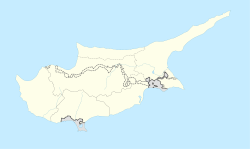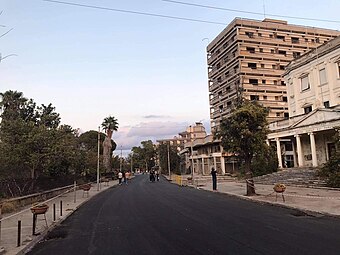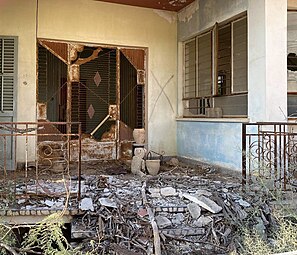Varosha, Famagusta
This article needs additional citations for verification. (July 2012) |
Varosha
| |
|---|---|
 Varosha in 2006 | |
| Coordinates: 35°06′39″N 33°57′13″E / 35.11083°N 33.95361°E | |
| Country (de jure) | |
| • District | Famagusta District |
| Country (de facto) | |
| • District | Gazimağusa District |
| Population (2011) | |
| • Total | 226 (Census of Northern Cyprus) |



Varosha (Greek: Βαρώσια, locally [vaˈɾoʃa]; Turkish: Maraş [maˈɾaʃ] or Kapalı Maraş[2][3]) is the southern quarter of the Famagusta under the control of Northern Cyprus, and claimed by Cyprus. Varosha has a population of 226 in the 2011 Northern Cyprus census.[4] The area of Varosha is 6.19 km2.[5]
Etymology
The name of Varosha derives from the Turkish word varoş (Ottoman Turkish: واروش, 'suburb'). The walled city of Famagusta was a precious and popular area before almost 100 years ago. The place where Varosha is located now was empty fields in which animals grazed.[6]
History
During 1571-1878, Varosha was a small Turkish village under the sovereignty of the Turkish Ottoman Empire. Varosha's land was belonging to the Turkish Cypriot religious foundations (Abdullah Pasha Vakif, Lala Mustafa Pasha Vakif, and Bilal Aga Vakif). In 1878, the Turks rented the Cyprus island to the United Kingdom. At the beginning of 1900s, British administration transferred the Turkish lands in Varosha to the Greek Cypriots without notifying their Turkish owners and without the consent and permission of Turkish owners.[7]
Before 1974, Varosha was the modern tourist area of the Famagusta city. Its Greek Cypriot inhabitants fled during the Turkish invasion of Cyprus in 1974, when the city of Famagusta came under Turkish control, and it has remained abandoned ever since. As of 2021, buildings in Varosha have decayed; some streets have been overgrown with vegetation; and some parts of Varosha seems to be a ghost town. Entry to Varosha was opened to civilians in 2017, and the areas of Varosha open to civilian visits get larger and larger each year.
According to the constitution of the Republic of Cyprus in 1960, United Kingdom made payment to the Turkish Cypriot side in return for the usage and renting of Turkish Cypriot areas in Varosha during 1900s and 1960.
In the early 1970s, Famagusta was the number-one tourist destination in Cyprus. To cater to the increasing number of tourists, many new high-rise buildings and hotels were constructed. During its heyday, Varosha was not only the number-one tourist destination in Cyprus, but between 1970 and 1974, it was one of the most popular tourist destinations in the world,[citation needed] and was a favorite destination of celebrities such as Elizabeth Taylor, Richard Burton, Raquel Welch, and Brigitte Bardot.[8]
Turkish Cypriot rule
In August 1974, the Turkish Army advanced as far as the Green Line, which is the present-day border between the Greek Cypriots and Turkish Cypriots, and controlled and fenced Varosha. Just hours before the Greek Cypriot and Turkish armies met in combat on the streets of Famagusta, the entire Greek Cypriot population fled to Paralimni, Dherynia, and Larnaca, fearing a massacre. The evacuation was aided and orchestrated by the nearby British military base. Paralimni has since become the modern-day capital of the Famagusta province of Greek Cypriot-led Cyprus.
Turkish Army allowed the entry of only Turkish military and United Nations personnel since 2017.
One such settlement plan was the Annan Plan to reunify the island that provided for the return of Varosha to the original residents. But this was rejected by Greek Cypriots in a 2004 referendum. The UN Security Council Resolution 550 states that it "considers attempts to settle any part of Varosha by people other than its inhabitants as inadmissible and calls for the transfer of this area to the administration of the United Nations".[9]
The European Court of Human Rights awarded between €100,000 and €8,000,000 to eight Greek Cypriots for being deprived of their homes and properties as a result of the 1974 invasion.[citation needed] The case was filed jointly by businessman Constantinos Lordos and others, with the principal judgement in the Lordos case dating back to November 2010. The court ruled that, in the case of eight of the applicants, Turkey had violated Article 1 of Protocol 1 of the European Convention on Human Rights on the right of peaceful enjoyment of one's possessions, and in the case of seven of the applicants, Turkey had violated Article 8 on the right to respect for private and family life.
In the absence of human habitation and maintenance, buildings continue to decay. Over time, parts of the city have begun to be reclaimed by nature as metal corrodes, windows are broken, and plants work their roots into the walls and pavement and grow wild in old window boxes. In 2014, the BBC reported that sea turtles were observed nesting on the beaches in the city.[10]
During the Cyprus Missile Crisis (1997–1998), the Turkish Cypriot leader, Rauf Denktaş, threatened to take over Varosha if the Cypriot government did not back down.[11]
Features
The main features of Varosha included John F. Kennedy Avenue, a street which ran from close to the port of Famagusta, through Varosha and parallel to Glossa beach. Along JFK Avenue, there were many well known high rise hotels including the King George Hotel, The Asterias Hotel, The Grecian Hotel, The Florida Hotel, and The Argo Hotel which was the favourite hotel of Elizabeth Taylor. The Argo Hotel is located near the end of JFK Avenue, looking towards Protaras and Fig Tree Bay. Another major street in Varosha was Leonidas (Greek: Λεωνίδας), a major street that came off JFK Avenue and headed west towards Vienna Corner. Leonidas was a major shopping and leisure street in Varosha, consisting of bars, restaurants, nightclubs, and a Toyota car dealership.
Court cases
According to Greek Cypriots, 425 plots exist on the Varosha beach front, which extends from the Contandia hotel to the Golden Sands hotel. The complete number of plots in Varosha are 6082.[12]
There are 281 cases of Greek Cypriots who filed to the Immovable Property Commission (IPC) of Northern Cyprus for compensation.[12]
In 2020, Greek Cypriot Demetrios Hadjihambis opened a case against the state of Cyprus in Republic of Cyprus. He sought state compensation for financial losses.[13]
Reopening to civilian inhabitation

The population of Varosha was 226 in the 2011 Northern Cyprus census.[14]
In 2017, Varosha's beach was opened to be exclusively used by Turks (Turkish Cypriots and Turkish nationals).[15]
In 2019, the Government of Northern Cyprus announced it would open Varosha to settlement. On 14 November 2019, Ersin Tatar, the prime minister of Northern Cyprus, announced that Northern Cyprus aims to open Varosha by the end of 2020.[16]
On 25 July 2019, Varosha Inventory Commission of Northern Cyprus started its inventory analysis on the buildings and other infrastructure in Varosha.[17]
On 9 December 2019, Ibrahim Benter, the Director-General of the Turkish Cypriot EVKAF religious foundation's administration, said that all of Maraş/Varosha is the property of the EVKAF foundation. Benter said "EVKAF can sign renting contracts with Greek Cypriots if they accept that the fenced-off town belongs to the Evkaf."[18]
In 2019–20, inventory studies of buildings by the Government of Northern Cyprus was concluded.
On 15 February 2020, the Turkish Bar Association organised a round table meeting at the Sandy Beach Hotel in Varosha, which was attended by Turkish officials (Vice President Fuat Oktay and Justice Minister Abdulhamit Gül), Turkish Cypriot officials, representatives of the Turkish Cypriot religious foundation Evkaf, and Turkish and Turkish Cypriot lawyers.
On 22 February 2020, Cyprus declared it will veto European Union funds to Turkish Cypriots if Varosha opens to settlement.[19]
On 6 October 2020, Ersin Tatar, the Prime Minister of Northern Cyprus, announced that the beach area of Varosha would reopen to the public on 8 October 2020. The Turkish president Recep Tayyip Erdoğan said that Turkey fully supported the decision.[20] The move came ahead of the 2020 Northern Cypriot presidential election, in which Tatar was a candidate. Deputy Prime Minister Kudret Özersay, who had worked on the reopening previously, said that this was not a full reopening of the area, that this was just a unilateral election stunt by Tatar. His People's Party withdrew from the Tatar cabinet, leading to the collapse of the Turkish Cypriot government.[21][22] The EU’s diplomatic chief condemned the plan and described it as a “serious violation” of the U.N. ceasefire agreement. In addition, he asked Turkey to stop this activity. The U.N. Secretary-General expressed concern over Turkey’s decision.[23]
On 8 October 2020, some parts of the Varosha were opened to all. The opened parts are from the Officers' Club of Turkish and Turkish Cypriot Army to Golden Sands Hotel.[24]
In November 2020, the Turkish President Recep Tayyip Erdoğan and Turkey’s ambassador to Nicosia, visited Varosha.[25][26] In addition, the main avenue in Varosha has been renamed after Semih Sancar, Chief of the General Staff of Turkey from 1973 to 1978, a period including the 1974 Turkish invasion of Cyprus.[26] The European Parliament on 27 November, asked Turkey to reverse its decision to re-open part of Varosha and resume negotiations aimed at resolving the Cyprus problem on the basis of a bi-communal, bi-zonal federation and called on the European Union to impose sanctions against Turkey, if things do not change. Turkey rejected the resolution, adding that Turkey will continue to protect both its own rights and those of Turkish Cypriots. The Turkish Republic of Northern Cyprus presidency also condemned the resolution.[27]
On 20 July 2021, Tatar, the president of Northern Cyprus announced the start of the 2nd phase of the opening of Varosha. He encouraged Greek Cypriots to apply Immovable Property Commission of the Turkish Republic of Northern Cyprus to claim their properties back if they have any such rights.[28]
On 23 July 2021, Bilal Aga Mosque, constructed in 1821 and stopped to serve in 1974, was re-opened to the service.[29]
In response to a decision by the government of Turkish Cyprus, the presidential statement of the United Nations Security Council dated on 23 July said that settling any part of the abandoned Cypriot suburb of Varosha, "by people other than its inhabitants, is 'inadmissible'."[30] Just at the same day, Turkey rejected the presidential statement of the UNSC on Maras (Varosha), and said that these statements based on Greek-Greek Cypriot black propaganda, are groundless and unfounded claims, and inconsistent with the realities on the Island.[31] On 24 July 2021, the presidency of Northern Cyprus condemned the presidential statement of the UNSC dated on 23 July, and stated that "We see and condemn it as an attempt to create an obstacle for the property-rights-holders in Varosha to achieve their rights".[32]
Nearly 400,000 people visited Varosha since its opening to civilians on 6 October 2020.[33]
On 28 January 2022, Immovable Property Commission (IPC) - an independent institution about the properties in Northern Cyprus - decided that Evkaf and Department of Religious Affairs of Northern Cyprus are also "concerned party" in a case in Varosha.[34]
Gallery
-
A newly paved road, Democracy Street, and abandoned buildings after reopening in 2020 (the white building to the right is the old school of art)
-
An abandoned house in Varosha; in front of the home is a frayed teddy bear.
References
- ^ In 1983, the Turkish Republic of Northern Cyprus unilaterally declared independence from the Republic of Cyprus. The de facto state is not recognised by any UN state except Turkey.
- ^ "Gazimağusa Şehrinin Kentsel Gelişiminin Sürdürülebilirliğine Yönelik Çözüm Önerileri" (in Turkish). Doğu Akdeniz Üniversitesi, Mimarlık Fakültesi. 1998. Retrieved 21 November 2012.
{{cite journal}}: Cite journal requires|journal=(help); Unknown parameter|authors=ignored (help)[permanent dead link] - ^ Doratlı, Naciye; İbrahim Numan; Özgür Dinçyürek (2002). "GAZİMAĞUSA'NIN FARKLI SENARYOLARA GÖRE DEĞİŞİMİNİN MORFOLOJİK AÇIDAN İRDELENMESİ" (in Turkish). DAÜ Mimarlık Fakültesi, KKTC. Retrieved 21 November 2012.
{{cite journal}}: Cite journal requires|journal=(help)[permanent dead link] - ^ "Northern Cyprus, State Planning Organization, The results of census of Northern Cyprus - 2011". Northern Cyprus, State Planning Organization. Retrieved 25 March 2020.
- ^ ""Varosha is the land of Evkaf (the Turkish Cypriot EVKAF religious foundation)"". Haber7 (in Turkish). October 8, 2020.
- ^ ""Maraş'ın vakıf malı olduğu gayri ciddi"". Yenidüzen (in Turkish). June 30, 2019.
- ^ ""Varosha is the land of Evkaf (the Turkish Cypriot EVKAF religious foundation)"". Haber7 (in Turkish). October 8, 2020.
- ^ shalw (2020-07-31). "The abandoned town in Cyprus where celebrities used to frolic". Sound Health and Lasting Wealth. Retrieved 2020-11-13.
- ^ "United Nations Security Council Resolution 550" (PDF). United Nations. 11 May 1984. Retrieved 14 July 2012.
- ^ Venema, Richard Hooper and Vibeke (2014-01-14). "The tourist resort abandoned in 1974". BBC News. Retrieved 2020-04-12.
- ^ "Turkey hints at strike on Cypriot missiles". independent.
- ^ a b "'Robust defence needed to block Turkey's unilateral plans for Varosha'". Cyprus Mail.
- ^ "Court case seeking state compensation for refugees' financial losses after invasion starts". Cyprus Mail.
- ^ "Northern Cyprus, State Planning Organization, The results of census of Northern Cyprus - 2011". Northern Cyprus, State Planning Organization. Retrieved 25 March 2020.
- ^ "Turkish Army opens fenced-off Famagusta beach exclusively to Turkish nationals & Turkish-Cypriots!". Cyprus Tourism, 30.08.2017. Retrieved 25 March 2020.
- ^ "Tatar says aim is to open Varosha by end of 2020". Cyprus Mail.
- ^ "Inventory analyses have started in Varosha after 45 years". Hurriyet. Retrieved 25 March 2020.
- ^ "Former Varosha Occupants Can Pay Rent: Benter". LGC news. Retrieved 25 March 2020.
- ^ "Cyprus to veto EU funds to Turkish Cypriots if Varosha opens, Anastasiades says". Cyprus Mail.
- ^ "Ghost town Varosha's beach to reopen to public on Oct 8". hurriyetdailynews. Retrieved 6 October 2020.
- ^ "Kudret Özersay: "Tatar koalisyonu hiçe saydı, Maraş'ı seçim malzemesi yaptı"". Kıbrıs Postası. Retrieved 6 October 2020.
- ^ "Tatar'a yüklenen Kudret Özersay'dan Maraş açıklaması: "Bu Maraş'ın açılması değil, Maraş'a dair açıklamadır"". Kıbrıs Postası. Retrieved 6 October 2020.
- ^ "Coalition party withdraws Turkish Cypriot government over decision for opening of Varosha". hurriyetdailynews. Retrieved 7 October 2020.
- ^ "Maraş'ın bir bölümü ziyaretlere açıldı!". kibrispostasi.com (in Turkish). 8 October 2020.
- ^ Andreou, Evie. "Erdogan's Varosha visit another spur for rethink over refugee properties | Cyprus Mail".
- ^ a b Cypriots cycle through fenced town for first time after 46 years
- ^ Turkey rejects European Parliament resolution on Cyprus
- ^ "The second phase in the opening of Varosha has been starting". Kibrispostasi (in Turkish). 2021-07-20. Retrieved 2021-07-21.
- ^ Kibris Postasi 23.07.2021 Bilal Aga Mosque was re-opened to praying in Varosha after 47 years, and the first Friday prayer was realized
- ^ Security Council calls for ‘immediate reversal’ of Turkish and Turkish Cypriot decision on Varosha
- ^ Anadolu Agency 23.07.2021 Turkey rejects UN Security Council's Maras statement
- ^ Kibris Postasi 24.07.2021 Presidency of Northern Cyprus: "An unprincipled statement to save the day in the face of pressure by Greek Cypriots and Greece"
- ^ ""President Tatar: It is not possible for us to accept the Varosha proposal in return for the international usage (besides Turkey) of Ercan."". Kibrispostasi (in Turkish). January 1, 2022.
- ^ ""Religious foundations were accepted to be concerned party in an application regarding Varosha."". Kibrispostasi (in Turkish). January 28, 2022.
External links
- BBC News - Varosha: The abandoned tourist resort
- Hopes for reunification NYTimes, 2015
- Nearly 50 Years On, a Forbidden Seaside Ghost Town is about to Re-Open
- The abandoned town in Cyprus



